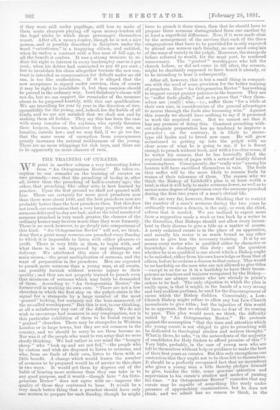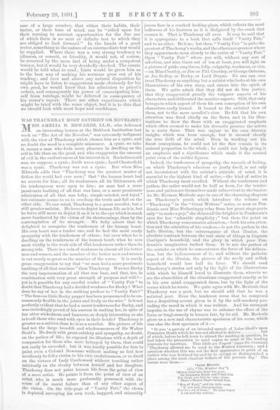THE TRAINING OF CURATES.
WE print in another column a very interesting letter from "An Octogenarian Rector." He takes ex- ception to our remarks on the training of curates on two grounds,—one, that the preaching of to-day is, after all, better than the preaching of half-a-century ago ; the other, that preaching, like other arts, is best learned by practice. Upon the first ground we shall not quarrel with him. There are certainly far more good preachers now than there were about 1840, and the best preachers now are probably better than the best preachers then. But this does not touch our contention that a very large proportion of the sermons delivered to-day are bad; and as the total number of sermons preached is very much greater, the chances of the ordinary hearer may be even worse than they were formerly. There is no need, however, to go deeply into comparisons of this kind. "An Octogenarian Rector" will not, we think, deny that a great many sermons are preached every Sunday to which it is impossible to listen with either pleasure or profit. There is very little in them, to begin with, and what there is, is not improved by any advantages of delivery. We attributed this state of .things to two main causes,—the great multiplication of sermons, and the want of preparation in the preachers. Men are expected to preach more sermons than a young man, at all events, can possibly furnish without serious injury to their quality ; and they are not properly trained to preach even that minimum of sermons which may fairly be demanded of them. According to "An Octogenarian Rector," the former evil is working its own cure. "There are not a few churches in which the first step on the pulpit-stairs is the signal for a stampede by a large number of the most 'genteel' looking, but certainly not the best-mannered, of the so-called worshippers." But this is not, to our thinking, at all a satisfactory way out of the difficulty. We do not wish to encourage bad manners in any congregation, nor is this particular exhibition of them to be found except in " enteel " churches. There may be stampedes in Western London or in large towns, but they are not common in the -country, and we should be sorry to see them become so. Nor was it of the people who want to run away that we were chiefly thinking. We had rather in our mind the "hungry sheep" who "look up and are not fed,"—the people who by custom and wish are disposed to listen to sermons, and who, from no fault of their own, listen to them with so little benefit. A change which would lessen the number of sermons to be prepared would be of service to this class in two ways. It would get them by degrees out of the habit of hearing more sermons than they can take in to any good purpose, and it would—though here "An Octo- genarian Rector" does not agree with us—improve the quality of those they continued to hear. It would be a very much better thing that a preacher should -have only one sermon to prepare for each Sunday, though he might have to preach it three times, than that he should have to prepare three sermons distinguished from one another by at least a superficial difference. Now, if it were made clear by the arrangement of the services that each of the three congregations that have to be provided for is only expected to attend one sermon each Sunday, no one need complain of the want of variety in the pulpit. Moreover, the stampede before referred to would, for the most part, be rendered unnecessary. The " genteel " worshippers who left the church before, or did not come in till after, the sermon, might be charitably supposed to have heard it already, or to be intending to hear it subsequently.
After all, however, this is but a small thing in compari- son with the need of some provision for the better training of preachers. Here "An Octogenarian Rector" has nothing to suggest except greater patience in the hearers. They are to "suffer fools gladly," and So to prove that "they them- selves are [really] wise,—i.e., suffer them "for a while at their own cost, in consideration of the general advantages to accrue through the fools also becoming wise." Against this remedy we should have nothing to say if it promised to work the required cure. But we cannot see that it has any promise of doing this. Constant preaching with- out adequate preparation has no tendency to improve a preacher ; on the contrary, it is likely to stereo- type old faults and to breed new ones. He will grow accustomed to getting up into the pulpit with no clear sense of what he is going to say, if he is fluent enough to preach without book, and with a too clear sense, if he writes his sermon, that he has hurriedly filled the required minimum of pages with a series of hastily diluted commonplaces. Consequently, the "really wise" among his hearers will have sacrificed themselves in vain. The fools they suffer will be the more likely to remain-1001s by reason of their tolerance of them. The reason why we think the Bishop of Lichfield's plan is at least worth a trial, is that it will help to make sermons fewer, as well as to secure some degree of supervision over the sermons preached during the first two years of a man's clerical life.
We are very far, however, from thinking that to restrict the number of a man's sermons during the two years he ordinarily remains a deacon, is the only, or even the chief, reform that is needed. We are inclined to expect more from a suggestion made a week or two back by a writer in the Guardian, that Bishops should not allow every incum- bent in their diocese to give a title as a matter of course. A newly ordained curate is in the place of an apprentice, and morally his rector is as much bound as any other master to give him the necessary training. It is by no means every rector who is qualified either by character or knowledge to discharge this duty ; and the question whether he is so qualified is one about which a Bishop ought to be satisfied, either from his own knowledge or from that of others, before be ordains a deacon to that curacy. This would be no hardship on the men who are not allowed to give titles —except in so far as it is a, hardship to have their incom- petence as teachers and trainers recognised by the Bishop— for there are always curates who are already in priest's orders to be bad. The only objection to which the plan is really open, is that it might, in the hands of a very strong and very reckless partisan, be used for the discouragement of views which the Bishop dislikes. Conceivably, a Low- Church Bishop might refuse to allow any but Low-Church incumbents to give titles ; but the injustice of this would be so apparent, that we should have no fear of its coming to pass. This plan would meet, we think, the difficulty raised by "An Octogenarian Rector." He protests against the assumption "that the time and attention which the young curate is not obliged to give to preaching will be dedicated to theological studies and serious thought." What is there, he asks, "in the antecedents of the majority of candidates for Holy Orders to afford promise of this" Very little, probably, in the case of young men who are left to themselves without help or guidance to make the best of their first years as curates. But this only strengthens our contention that they ought not to be thus left to themselves. It should be a perfectly recognised fact that an incumbent who gives a young man a, title thereby pledges himself to give, besides the title, some genuine attention and. supervision to his curate's studies and modes of passing his time. "An Octogenarian Rector" concedes that any curate may be capable of something like study under pressure of approaching examinations, but he does not think, and we admit has no reason to think, in the case of a large number, that either their habits, their tastes, or their tone of mind, can be "relied upon for their turning to account opportunities for the due use of which there is no near or definite test to which they are obliged to look forward." Ili the hands of a good rector, something in the nature of an in tertnediate test would be supplied. Where there was a very strong tendency to idleness, or conceit, or frivolity, it would not, of course, be removed by the mere fact of being under a competent trainer, but it would be very decidedly checked. The curate would be told what to read ; hints would be given him as to the best way of making his sermons grow out of his reading ; and over and above any natural disposition he might have to listen to suggestions made obviously for his own good, he would know that his admission to priest's orders, and consequently his power of emancipating him- self from tutelage, might be deferred in consequence of his rector's report. There are other experiments which might be tried with the same object, but it is to this that we should look with most hope and confidence.







































 Previous page
Previous page